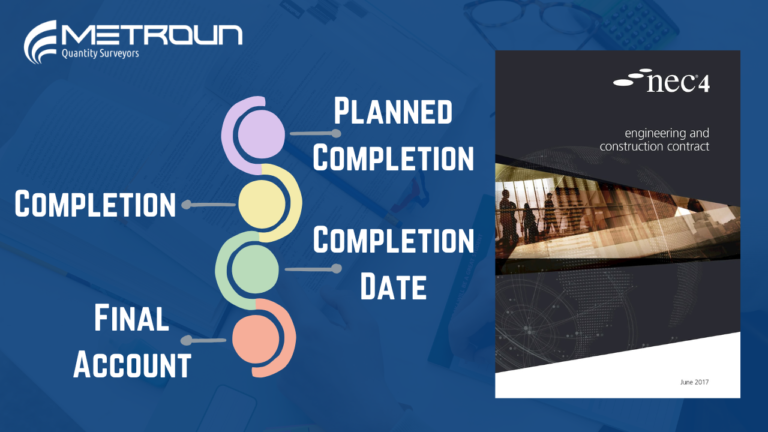Introduction
If you’re working on an NEC4 ECC contract, you’ll need to know about the different types of completion dates. In this article, we cover the important distinction between contractual, planned & actual completion dates.
We’ll investigate the following terms:
- Completion Date
- planned Completion
- And Completion
NEC4 ECC Completion Date
Under NEC4 ECC, the Completion Date is defined as the date by which the contractor must complete the works. It is a contractual term described under Clause 11.2(2) and Clause 11.2 (3). The Completion Date is determined when the contract is signed and can be adjusted through accepted compensation events. This is the date the contractor must aim to complete all the work stipulated in the contract to avoid liability for delay damages. Any work completed after the Completion Date exposes the contractor to potential penalties, such as delay damages, as stated under Option X7.
NEC4 ECC Planned Completion
Planned Completion, on the other hand, is mentioned within Clause 31.2. You’ll notice the word planned is a small p. This is because planned is not a defined term. This refers to the date the contractor expects to complete the works. Planned Completion is not a fixed contractual obligation but rather a forecasted date, which can change throughout the project. The difference between planned Completion and the Completion Date gives insight into the contractor’s time risk. If planned Completion is earlier than the contractual Completion Date, the contractor has a time buffer, also known as terminal float. If it’s later, the contractor is at risk of delay and potential liability for damages.
Key Differences
- Completion Date: This is a contractually binding date stated in the contract by which all works must be completed, subject to any agreed extensions.
- Planned Completion: This is a dynamic, non-binding date that is regularly updated in the programme to reflect the contractor’s progress and anticipated completion.
The contractual Completion Date can be extended through compensation events as defined under Clause 60. When such events occur, they may delay the project, and the contractor can notify for an extension under Clause 61. Clause 63.5 clarifies that Completion Date moves by the amount that planned completion moves due to the affects of a compensation event. If the compensation event is accepted, the Project Manager will adjust the Completion Date in accordance with Clause 66.2.
It’s crucial to distinguish between these types of completion dates because failure to meet the contractual Completion Date can result in delay damages. However, exceeding planned Completion only raises internal concerns for the contractor but does not in itself result in penalties unless it jeopardises the contractual Completion Date.
In practice, a contractor should aim to keep the planned Completion earlier than or in line with the Completion Date. Regular updates to the programme (within the defined timeframe as per Clause 32) are required to reflect the latest planned Completion. This allows for proactive management of time risks and alignment with the overall project objectives.
Completion
Finally, Completion is the date when the works are physically completed and certified by the Project Manager, as defined under Clause 11.2 (2). Actual Completion is significant because it is used to determine if the works were completed before or after the contractual Completion Date. If works are Completed after the Completion Date, the contractor could be subject to delay damages.
In summary, the NEC4 ECC contract differentiates between the Completion Date, which is the legal deadline for completing the works, planned Completion, which is the contractor’s expected finish date and Completion, when works are actually completed.
Introducing Metroun Learning
Metroun Learning is an online education platform, specific to Quantity Surveyors which can satisfy all your formal CPD needs. We offer over 45 hours of formal CPD, with new courses added each month. Although all courses amass to 45 hours of formal CPD, each individual course has been engineered so it can be completed during your lunch break. This can save you time, money & reduce your carbon footprint. Metroun Learning will not only satisfy your formal CPD needs, but you’ll also gain access to:
- The QS Dictionary
- Industry-Ready Templates
- Metroun AI
- And a variety of construction conversion calculators
To join Metroun Learning, simply click here





